Related Research Articles
Arianism is a Christological doctrine considered heretical by all modern mainstream branches of Christianity. It is first attributed to Arius, a Christian presbyter who preached and studied in Alexandria, Egypt. Arian theology holds that Jesus Christ is the Son of God, who was begotten by God the Father with the difference that the Son of God did not always exist but was begotten/made before time by God the Father; therefore, Jesus was not coeternal with God the Father, but nonetheless Jesus began to exist outside time.
The Second Coming is the Christian and Muslim belief that Jesus Christ will return to Earth after his ascension to Heaven. The idea is based on messianic prophecies and is part of most Christian eschatologies. Other faiths have various interpretations of it.

Transubstantiation is, according to the teaching of the Catholic Church, "the change of the whole substance of bread into the substance of the Body of Christ and of the whole substance of wine into the substance of the Blood of Christ". This change is brought about in the eucharistic prayer through the efficacy of the word of Christ and by the action of the Holy Spirit. However, "the outward characteristics of bread and wine, that is the 'eucharistic species', remain unaltered". In this teaching, the notions of "substance" and "transubstantiation" are not linked with any particular theory of metaphysics.

John Shelby "Jack" Spong was an American bishop of the Episcopal Church, born in Charlotte, North Carolina. He served as the Bishop of Newark, New Jersey from 1979 to 2000. Spong was a liberal Christian theologian, religion commentator, and author who called for a fundamental rethinking of Christian belief away from theism and traditional doctrines. He was known for his progressive and controversial views on Christianity, including his rejection of traditional Christian doctrines, his advocacy for LGBTQ rights, and his support for interfaith dialogue. Spong was a contributor to the Living the Questions DVD program and was a guest on numerous national television broadcasts. Spong died on September 12, 2021, at his home in Richmond, Virginia, at the age of 90.
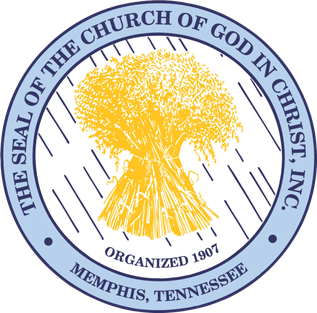
The Church of God in Christ (COGIC) is an international Holiness–Pentecostal Christian denomination, and a large Pentecostal denomination in the United States. Although an international and multi-ethnic religious organization, it has a predominantly African-American membership based within the United States. The international headquarters is in Memphis, Tennessee. The current Presiding Bishop is Bishop John Drew Sheard Sr., who is the Senior Pastor of the Greater Emmanuel Institutional Church of God in Christ of Detroit, Michigan. He was elected as the denomination's leader on March 27, 2021.
Oneness Pentecostalism is a nontrinitarian religious movement within the Protestant Christian family of churches known as Pentecostalism. It derives its name from its teaching on the Godhead, a form of Modalistic Monarchianism commonly referred to as the Oneness doctrine. The doctrine states that there is one God―a singular divine spirit with no distinction of persons―who manifests himself in many ways, including as Father, Son, and Holy Spirit. This stands in sharp contrast to the mainstream doctrine of three distinct, eternal persons posited by Trinitarian theology.

James the Just, or a variation of James, brother of the Lord, was a "brother" of Jesus, according to the New Testament. He was the first leader of the Jerusalem Church of the Apostolic Age. Traditionally, it is believed he was martyred in AD 62 or 69 by being stoned to death on the order of High Priest Ananus ben Ananus. James, Joses, Simon, and Judas are mentioned as the "brothers" of Jesus as well as two or more unnamed "sisters".

The Metropolitan Archdiocese of Philadelphia is a Latin Church ecclesiastical territory, or diocese, of the Catholic Church in southeastern Pennsylvania in the United States.

The Church of Our Lord Jesus Christ of the Apostolic Faith is a Oneness Pentecostal church with headquarters in Manhattan. It was founded in 1919 by Robert C. Lawson.

The Church of God and Saints of Christ is a Black Hebrew Israelite new religious group established in Lawrence, Kansas, in the United States, by William Saunders Crowdy in 1896. William Crowdy began congregations in several cities in the Midwestern and Eastern United States, and sent an emissary to organize locations in at least six African countries. The congregation later established locations in Cuba and the West Indies.

The Diocese of Scranton is a Latin Church ecclesiastical jurisdiction, or diocese, of the Catholic Church in northeastern Pennsylvania in the United States. It is a suffragan see of Archdiocese of Philadelphia, established on March 3, 1868.
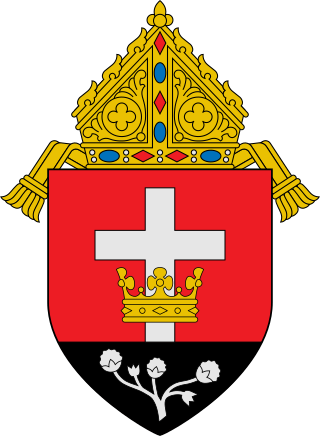
The Diocese of Lubbock is a Latin Church ecclesiastical territory, or diocese, of the Catholic Church in West Texas in the United States. It is a suffragan diocese in the ecclesiastical province of the metropolitan Archdiocese of San Antonio.

Ecclesiastical polity is the government of a church. There are local (congregational) forms of organization as well as denominational. A church's polity may describe its ministerial offices or an authority structure between churches. Polity relates closely to ecclesiology, the theological study of the church.
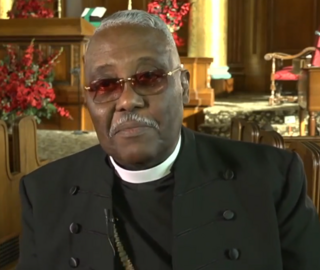
Jesse Delano Ellis, II, commonly known as J. Delano Ellis, was an American Protestant religious leader and progenitor of unity among African American Pentecostals with Trinitarian and nontrinitarian affinities.
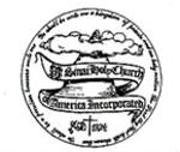
The Mount Sinai Holy Church of America (MSHCA) is a Christian church in the Holiness-Pentecostal tradition. The church is episcopal in governance. It has approximately 130 congregations in 14 states and 4 countries and a membership of over 50,000. Its headquarters is in Philadelphia, Pennsylvania.
The historical roots of Papal primacy can be traced back to the early centuries of Christianity, wherein the bishop of Rome, commonly referred to as the Pope, gradually accrued increasing authority and recognition. A confluence of historical, theological, and political factors contributed to this development.

In the liturgical traditions of the Catholic Church, the term ordination refers to the means by which a person is included in one of the holy orders of bishops, priests or deacons. The teaching of the Catholic Church on ordination, as expressed in the 1983 Code of Canon Law, the Catechism of the Catholic Church, and the apostolic letter Ordinatio sacerdotalis, is that only a Catholic male validly receives ordination, and "that the Church has no authority whatsoever to confer priestly ordination on women and that this judgment is to be definitively held by all the Church's faithful." In other words, the male priesthood is not considered by the church a matter of policy but an unalterable requirement of God. As with priests and bishops, the church ordains only men as deacons.
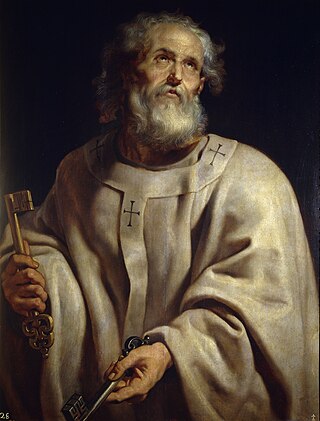
Saint Peter, also known as Peter the Apostle, Simon Peter, Simeon, Simon, or Cephas, was one of the Twelve Apostles of Jesus Christ and one of the first leaders of the early Christian Church. He appears repeatedly and prominently in all four New Testament gospels as well as the Acts of the Apostles. Catholic tradition accredits Peter as the first bishop of Rome—or pope—and also as the first bishop of Antioch.
References
- ↑ "Sherrod C. Johnson". www.apostolicarchives.com. Retrieved 2021-01-10.
- ↑ "Bishop S.C. Johnson". www.tcljc.com. Retrieved 2023-10-19.
- ↑ "Bishop S. McDowell Shelton". www.tcljc.com. Retrieved 2023-10-19.
- ↑ Lee, Nathaniel (2 March 2019). "Church of the Lord Jesus Christ: An open and welcoming environment". The Philadelphia Tribune. Retrieved 2021-01-10.
- ↑ "Judge Says Attorneys And Their Religious Client Defamed Him". Courthouse News.
- ↑ Slobodzian, Joseph (2012-06-29). "Court rejects taking case of church's struggles". The Philadelphia Inquirer. Retrieved 2023-10-19.